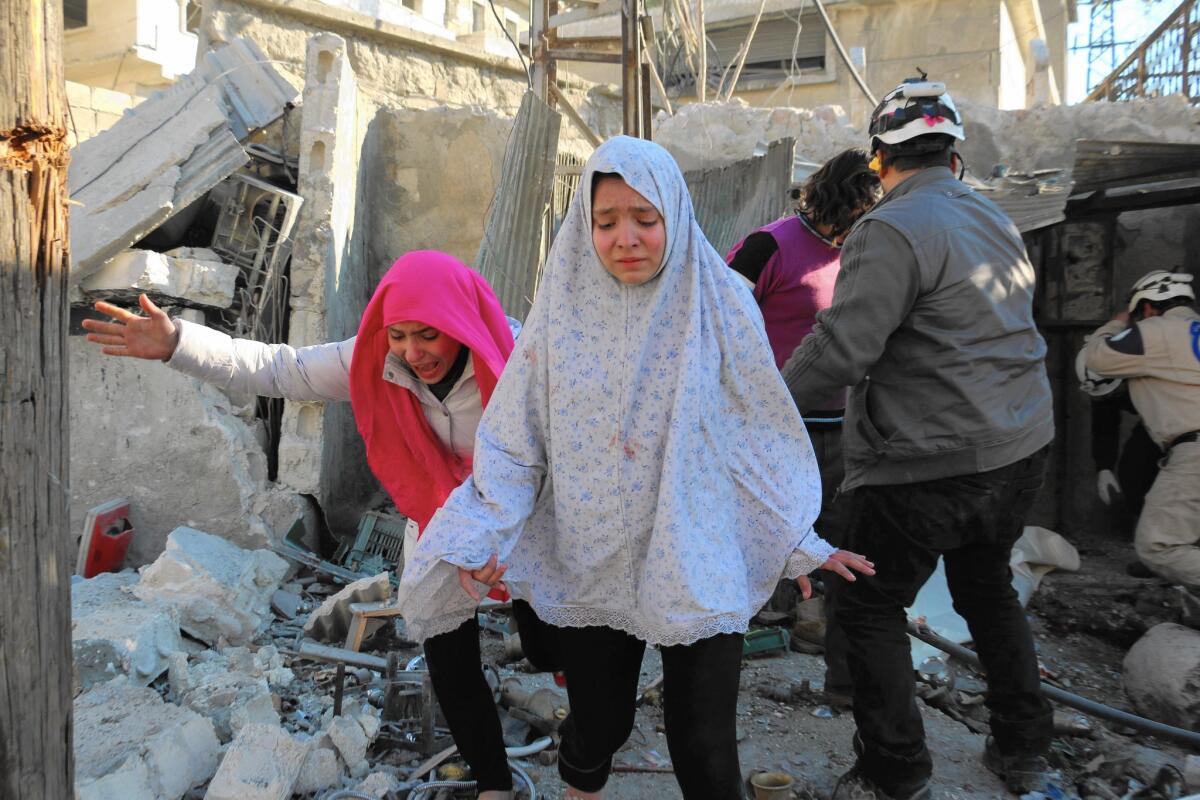Syrian army gains in north and south; two rebel-held towns agree to cease-fire

Girls make their way through a rebel-controlled neighborhood in Aleppo after an airstrike on Feb. 8.
- Share via
reporting from AMMAN, Jordan — As the Syrian army pushes toward the Turkish border in the north, the government is also achieving major gains in strategic southern Syria near the Jordanian frontier.
Aided by Russian airstrikes, Syrian officials have vowed to close off the Turkish and Jordanian borders, long crucial conduits for opposition arms, supplies and fighters entering Syria.
On Monday, a pair of rebel-controlled towns near Dara, the south’s major city, agreed to a cease-fire with the government as part of a deal that would stop airstrikes and allow aid into the towns, according to opposition and pro-government accounts.
MORE: Get our best stories in your Facebook feed >>
Meanwhile, pro-government forces in the north continued to overrun opposition-held territory in Aleppo province, which stretches to the Turkish border. The city of Aleppo, like Dara, has long been divided between government and opposition forces.
The recent fighting in the Aleppo area has driven more than 30,000 Syrians toward Turkey, with more on the way, aid groups say.
But Turkish officials, who already host more than 2 million Syrian refugees, were not allowing the recent arrivals to enter the country. Instead, Turkey said it was providing aid in camps on the Syrian side, just inside the border gate.
In Ankara, Turkey’s capital, German Chancellor Angela Merkel met with Turkish Prime Minister Ahmet Davutoglu as the two sought new ways to reduce the influx of Syrian and other migrants into Europe via Turkey. The German leader is under fierce political pressure at home after more than 1 million asylum seekers were registered last year in Germany, causing social and economic strains in the heart of Europe. But neither leader offered new solutions to the problem as the numbers fleeing fighting in Syria continued to grow.
The government of President Bashar Assad has for years pursued truces — known as “reconciliation” deals — in rebel-held zones, with mixed success. Some in the opposition assail the accords as de facto capitulations, but others call them a means of avoiding further bloodshed while retaining some degree of self-governance.
NEWSLETTER: Get the day’s top headlines from Times Editor Davan Maharaj >>
The latest such agreement, with the southern towns of Ibta and Dael, will also see the release of detainees. In addition, the accord will allow rebel fighters and gunmen to be in charge of the towns’ security and protection, according to the Syrian Observatory for Human Rights, a pro-opposition monitoring group based in England.
“Regime authorities warned the notables [leaders] during the meeting that if any government forces are targeted by the fighters in the town[s] then government forces will intervene militarily,” the observatory said in a statement.
Details of the accord in the two southern towns also appeared in a number of pro-government outlets, including Al Manar, a Lebanese news broadcaster affiliated with Hezbollah, the Lebanese Shiite militant group and staunch Damascus ally.
Videos circulated on social media Monday purported to show the Syrian flag being raised over public institutions in Ibta as part of the deal. Opposition activists, however, reported that the flag was later taken down and burned by those opposed to any agreement with the government.
The truce with the two towns gives the Syrian army effective control of the old Damascus-Dara highway, a vital supply route that had been partially under rebel sway for more than three years.
The accord came days after government forces retook control of a pair of previously rebel-held southern towns, Atman and Al-Sheikh Maskin, both north of Dara.
The setbacks reflect a wider malaise in rebel ranks in the south, where, less than six months ago, the opposition seemed poised to wrest control of Dara province and its provincial capital. That offensive was reportedly backed by the Military Operations Command, a secret command center in Jordan staffed by Western and Arab intelligence operatives that has provided logistical and arms support to the rebels.
But the offensive, spearheaded by a loose coalition of rebel factions named “the Southern Front,” soon floundered.
Since then, rebels in the south, once touted by Western officials as the best hope for “moderate” opposition forces in Syria, have been on the defensive. Some observers contend that the international operations center has largely cut back its support — an assertion vehemently denied by spokesmen for the rebel factions.
United Nations-brokered peace talks between the Syrian government and opposition figures broke down last week in Geneva with each side blaming the other for the lack of progress. U.N. officials hope to reconvene the talks this month.
Special correspondent Bulos reported from Amman and Times staff writer McDonnell from Beirut.
Twitter: @mcdneville
ALSO
Former murder capital of Mexico presents sunnier image for pope
Hong Kong protesters supporting food hawkers clash with police
Punish or engage? No easy answer to North Korea’s nuclear ambitions
More to Read
Sign up for Essential California
The most important California stories and recommendations in your inbox every morning.
You may occasionally receive promotional content from the Los Angeles Times.











